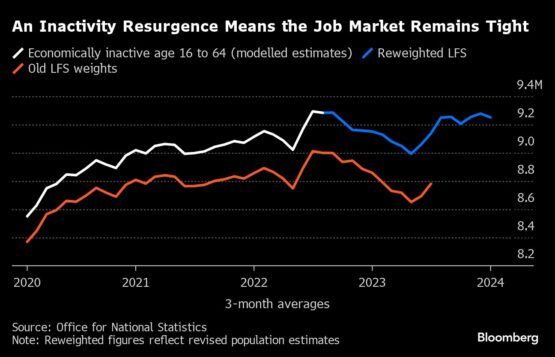Britain faces a £16 billion ($20.1 billion) annual bill to cover the spiralling cost of disability benefits over the next five years as the country grapples with the longest sustained rise in health-related inactivity since the 1990s.
Analysis by the Resolution Foundation think tank found that the UK is in the midst of a unique employment crisis, with 600 000 more working-age Britons than before the pandemic neither in work nor looking for a job due to ill health.
ADVERTISEMENT
CONTINUE READING BELOW
The UK is the only Group of Seven industrial nation where the employment rate has failed to recover to pre-pandemic levels, a direct consequence of the surge in long-term sickness. The lack of available workers has become one of the most pressing economic issues the country faces.

Inflation has been more sticky in the UK than other countries because employers are having to pay higher wages to attract scare workers. The Bank of England says the tight labour market has lowered the economy’s growth capacity.
Resolution’s analysis of both official jobs data and government benefit payments found that the problems appear to be concentrated among the young, aged 16 to 24, and the old, aged 55-64. The figures tally with Office for National Statistics data on overall economic inactivity, which shows that the young and the old account for 90% of the increase since 2019.
This “U-shaped pattern,” with middle-aged groups seemingly unaffected, “could have serious effects both on individual’s living standards and career paths, as well as wider strains on the NHS and welfare spending,” said Louise Murphy, senior economist at the Resolution Foundation.
The Office for Budget Responsibility’s latest forecasts show spending on disability benefits rising by £16.1 billion before adjusting for inflation to £52.2 billion between 2023-24 and 2028-29, a 45% increase.
Resolution said the trend reflected older workers being more likely to experience ill-health, with more than half of all Universal Credit claimants aged 58 and above suffering from a work-limiting health condition, “and a worrying recent trend of deteriorating health among young people.”

ADVERTISEMENT
CONTINUE READING BELOW
An official survey of more than 50 000 people for the Department for Work and Pensions found that 47% of working-age people with some form of disability cited mental health as an impairment.
The upward trend in long-term sickness started just before the pandemic, in the summer of 2019, and has lasted for 54 months. The longest previous period of increasing economic inactivity due to ill-health was for 55 months, between 1994 and 1998, Resolution’s analysis found.
Recent research by the think tank has shown that people in their early 20s are now more likely to be economically inactive due to ill health than those in their 40s.
Health-related inactivity is likely to remain a major challenge for years to come and should be a top priority for whoever wins the next election, Resolution added.
© 2024 Bloomberg


